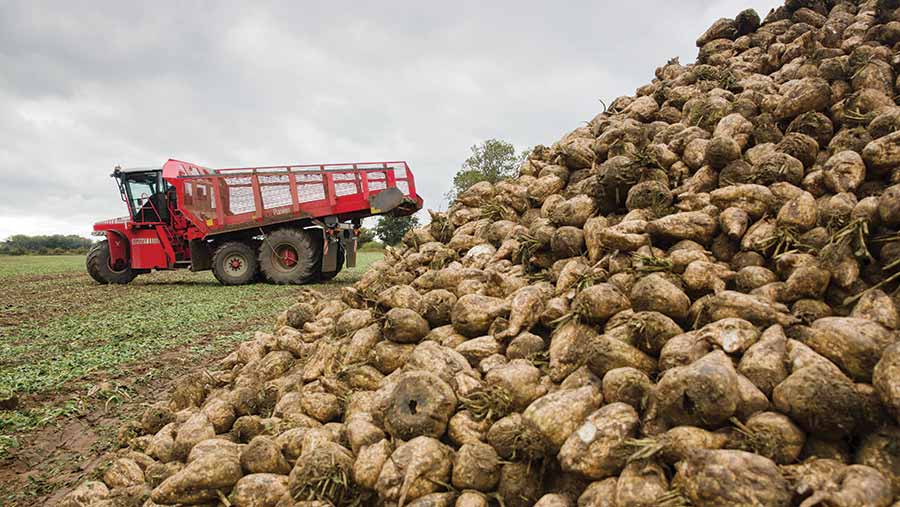Beet growers well placed to meet post-quota volatility
 ©Tim Scrivener
©Tim Scrivener Sugar beet growers are well placed to compete against overseas producers once quotas are lifted in 2017 – but crop profitability is difficult to forecast, a market analyst has warned.
Abolishing quotas would give the industry the opportunity to expand to supply the internal EU market as well as the wider world market, said Martin Todd, managing director of LMC International, a UK-based economic consultancy specialising in agricultural commodities.
But British growers would also have to contend with competition from imports of sugar and isoglucose – as well as competition from overseas producers who would be supplying the global market too – once quotas ended on 30 September 2017.
See also: Post-quota sugar beet price options revealed to growers
“Fundamentally, beet is doing very well – not only against cane sugar but also against other crops against which it is fighting for a place in the farm rotation,” Mr Todd told a meeting of 380 sugar beet growers at the East of England Showground, Peterborough, on Friday (13 November).
“The end of quotas is going to be an opportunity for the efficient in Europe to expand production,” said Mr Todd. “That will be not only to supply the internal market, but also the external market. But we know it isn’t going to be easy and we know there are going to be a lot of risks.”
Growers have already experienced the impact of volatile prices during the past three or four years.
That situation would be compounded by other market uncertainties post-2017, suggested Mr Todd. Volatility was going to remain a feature of the sector, he added.
Future uncertainties that would affect price included the level of isoglucose production, EU sugar imports and the extent to which other European countries would continue to produce sugar – as well as their cost base, Mr Todd told growers.
Beet was doing well in terms of yield growth against alternative crops across the EU, he added. It was also performing well against cane sugar. But at the same time, different cost influences made it very difficult to predict how profitable sugar beet would be.
“That complicates the picture further – and then there is the impact of the weather,” said Mr Todd. As now, the European sugar price may not be the same as the world price – and it was likely that there would still be different prices for different markets.
Case study: Laura Rous, Dennington Hall Farms, Woodbridge, Suffolk
Longer contracts and more price certainty are key for many farmers considering whether to continue growing sugar beet after quotas end in 2017.
“Whether we grow beet in the future depends on whether we are going to get a return – and whether that return is something we can manage sensibly,” said Laura Rous, of Dennington Hall Farms, near Woodbridge, Suffolk.
“I fully appreciate that lots of people will want something different from their contracts – but what we would quite like is a three- to five-year contract, ideally with a minimum price guarantee.”
Some 60ha of sugar beet are grown by the business alongside 1,200ha of combinable crops and vining peas. “Beet is a small but important part of our rotation,” said Ms Rous. “It has been a steady break crop and has easy-to-forecast margins – with good cashflow.”
Constraints to growing more beet include an average field size of just 6ha – the farm has rarely, if ever, grubbed up hedgerows – and soil type, which is a mixture of heavy Hanslope clay and Series 1 Beccles sandy clay loam.
Yielding about 70t/ha, beet is lifted by contractors early in the season. A Maus loader helps deal with smaller fields, making beet growing viable across more of the farm. But soil compaction is an issue, although the crop spreads the annual workload and helps in blackgrass control.
Ms Rous said the business would have to “think very hard” about growing beet in future if the option of an early lift were no longer available. It was also difficult to consider growing more beet if there was no way of mitigating volatility.
Spreading risk is all important, said Ms Rous. “That is my main concern – [as cereal growers] we are exposed to volatility in commodity markets and we like beet a lot because have been protected from the volatility of the sugar markets.”
